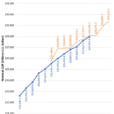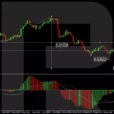
Ask most people how much a lottery ticket is worth and the most probable answers will be the price of the ticket, the value of the jackpot or simply: “Is it a winning ticket?” The value of a ticket for a forthcoming drawing is none of these. The reason for this is related to a concept of risk and reward many people often fail to grasp, aren’t aware of or ignore at their own peril.
The concept is expected value. This is the projected value based on the probability of a given set of outcomes occurring. If it is possible to assign odds to a set of monetary outcomes, an expected value can be calculated. Expected value is a concept that works in a variety of situations. Investors, for instance, can use historical data to determine the likelihood of being able to fund retirement with a certain savings rate or allocation strategy.
The two multi-state jackpot lottery games provide great examples of how the concept of expected value works. Both Mega Millions and Powerball have specific and published odds for the possible winning outcomes. They also have published prize amounts. This allows anybody with a calculator—though a spreadsheet makes the calculations easier—to determine when the expected value of a lottery ticket exceeds the $2.00 cost.
The calculation is simply each potential payout times the odds of having a ticket with the right combination of numbers. For example, the odds of having a single matching number and the Powerball number correct on a single ticket is 1 in 92. One divided by 92 equals approximately 1.09%. Multiplying 1.09% by the fixed $4.00 payout results in an expected value of $0.04. Put another way, if you adjust the value of the prize by the probability of actually winning the prize, you end up with an expected value of $0.04. Running this math for all of the fixed payouts gives us cumulative expected values of $0.25 for a Mega Millions ticket and $0.32 for a Powerball ticket.
The big prize in both games is, of course, the jackpots. Both the sheer size and the variable nature of the jackpot give it great influence on the expected value of a lottery ticket. Not surprisingly, the larger the jackpot, the higher the expected value. Consider the March 30, 2018, Mega Millions drawing, which awarded one lucky person a $521 million prize. The jackpot single-handedly added $1.72 to the expected value of each ticket purchased for the drawing. The math was $521 million times the 0.0000003% odds of matching all five primary numbers plus the sixth Mega Ball number.











Leave A Comment